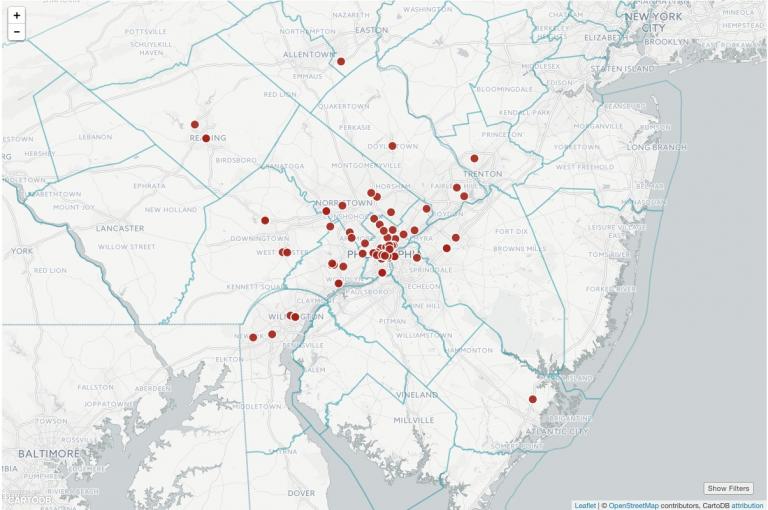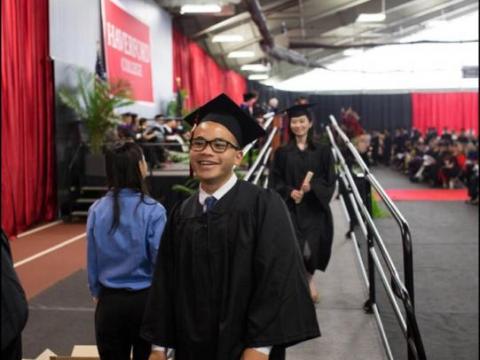
Economics Major and Minor
We are a vibrant community of students and faculty interested in understanding human behavior, social interactions, and economic performance through an economic lens. Our rigorous program grounds students in a range of theoretical approaches, equips them with the statistical tools used to test theories empirically, and provides a challenging as well as supportive atmosphere in which to develop their own original research.
Curriculum & Courses
We offer introductory and upper level courses in theory and in empirical methods as well as a number of electives that explore a variety of economic topics. Our faculty, who specialize in a wide array of fields and methodological approaches, are committed teachers, researchers, and mentors. In our small classes and research-heavy curriculum, they build strong relationships with students.
Majors and minors pursue a core course of study that includes classes in introductory (100- level) and intermediate theory (300-level), and introductory statistical methods (200-level). Two semesters of calculus are also required. In addition, majors will take more advanced econometric methods (300-level).
Our 200- and 300-level electives give students the opportunity to apply economic tools to particular topics such as labor markets, monetary policy, finance, and international trade. Not required but open to minors are our Junior Research Seminars, also developed around a specific economic topic or issue, they enable our students to develop their research skills in a small class setting with strong faculty support. Those skills are honed and put to use in our required Senior Research Seminar and senior thesis for majors.
The resources available to our students extend far beyond the classroom. They include accomplished alumni who continue to engage with the program, as well as a top-flight speaker series that brings students face-to-face with world-renowned economists and policy makers.
-
Major Requirements
- MATH H105 or MATH H118 (or Placement into MATH H121)
- ECON H104, ECON H105 or ECON H106
- ECON H203 or ECON H204
- ECON H201
- ECON H300
- ECON H302
- ECON H304
- ECON H396A and ECON H396B
- FOUR other semester-long economics electives above the 100 level, including two 300-level courses, one of which must be a Junior Research Seminar (ECON H37X, H38X).
-
Majors are advised to take the following courses by the end of their sophomore year:
-
ECON H104 , ECON H105 or ECON H106.
-
ECON H201
-
ECON H203 or ECON H204.
-
One of the intermediate theory courses (ECON H300 or ECON H302).
-
- Majors are required to complete ECON H300 AND ECON H302 by the end of their junior year.ECON H304 and the Junior Research Seminar must be completed by the end of fall semester of senior year.
- ECON H396A and ECON H396B are taken during the fall and spring, respectively, of senior year.
Other Information about the Major
Students may count many courses from the Bryn Mawr Economics Department toward the Haverford economics minor and major, including ECON B105. Some courses have different numbering across the campuses, in particular ECON B253 at Bryn Mawr, which counts as a direct substitute for ECON H203. The two economics departments plan their course schedules jointly so that they can offer the maximum variety of economics courses across the two campuses. Haverford Economics majors may not take the intermediate theory sequence (ECON B200 and ECON B202 ) at Bryn Mawr.
In order to count a course toward the major or minor requirements, the student must earn a grade of 2.0 or higher. Students with strong economics backgrounds may place out of ECON H104/ECON H105/ECON H106 through a placement test, but they will be required to take an extra elective to complete the major.
Students who plan to apply to graduate programs in public policy or business should take additional math courses through at least MATH H121 (Multivariable Calculus III) and at least one computer science course. Similarly, students who are planning to apply to Ph.D. programs in economics should take mathematics through at least MATH H215 (Linear Algebra) and MATH H317(Analysis I). Economics majors also have the option to pursue the Concentration in Mathematical Economics, which is described under its own heading in this catalog.
Senior Project
The senior thesis at Haverford College is the culmination of a four-year learning process during which students develop their scholarly interests and become independent thinkers. The yearlong, two-semester Senior Research Seminar in Economics imparts skills and techniques essential to students undertaking original independent research projects. The first (fall) semester includes:
- workshops on research techniques, on thesis writing skills and on data collection and management with Excel and Strata;
- presentations of working papers by visiting scholars preceded by small group critiques of each paper;
- and one-on-one work with a faculty member to develop a thesis proposal.
The course focuses on acquisition of tools to conduct original research, learning how to engage in scholarly discussions, and learning about critical analysis. By the end of the fall semester, students have developed an original research idea and written a formal proposal for the thesis which they have orally presented to a sub-section of the class. The faculty members overseeing the class must approve the proposal. Independent work under the guidance of a faculty advisor begins at the end of the first semester and continues throughout the second semester. During the second (spring) semester, students develop their thesis through extensive reading, empirical and or theoretical analysis of the research question, individual sessions with a faculty advisor, and group discussion. The final thesis is an original economic contribution to the field of knowledge in which the thesis is located. Each student demonstrates a clear mastery of the literature surrounding the research question, an understanding of the theoretical underpinnings of the question, and adequate analysis and discussion of results.
Senior Project Learning Goals
Students will learn to:
- craft a viable economics research question and design a project that will answer it.
- summarize the economic scholarship related to this question while discovering and articulating relationships among texts and contextualizing the research question within the broader literature.
- construct and execute an analytic argument that culminates in well-grounded and testable hypotheses.
- collect, manage, and analyze data to test the hypotheses.
- develop and articulate well-founded conclusions based on the empirical or theoretical evidence.
- write a professional-quality research paper that presents their work and findings.
- present the findings of their research orally using relevant visual aids (graphs, tables, mathematical equations, for example).
Senior Project Assessment
We provide two rubrics for assessment of the economics senior thesis, one for a theoretical thesis and one for the more common empirical thesis. The rubrics, which assess the written thesis, were tested and approved by faculty members in the spring of 2014. Currently each faculty member will assess the thesis of their advisees, providing a rating of each criterion. While the ratings will be related to the final grade that the student receives, the faculty member will have the opportunity to incorporate other facets of the students’ experience to the grading process such as creativity, improvement, perseverance, etc. At the time of grading, the ratings will be submitted to the department’s administrative assistant who will compile the results, using a numerical translation of the ratings (4=excellent; 3=proficient, etc.). Each fall, the department will meet and look over the ratings to determine which categories the students are more or less proficient in and where we have seen improvement or setbacks and to assess the continued relevance of the criteria. The outcome of this meeting will guide changes to the fall senior thesis curriculum and potentially to the economics major curriculum as well as changes to the rubric.
Requirements for Honors
The Economics Department will grant departmental honors on the basis of outstanding academic performance and integrity in economics courses, and contribution to the intellectual life of the department.
Associated Programs and Concentrations
Research & Outreach
Each major produces an original independent research project over the course of their senior year. Work on the thesis proceeds through our Senior Research Seminar. In it, seniors cultivate their writing and data collection and management skills, while also developing their own research questions. The seminar also includes a series of presentations by visiting scholars followed by student critiques that sharpen critical analysis skills. By the end of the fall semester, students write and present their research proposals. During the spring semester, they develop their projects and write their theses under the guidance of a faculty advisor in one-on-one as well as group sessions.

The political science major and economics minor studied the opioid epidemic in Philadelphia from a public policy perspective.

This economics course, cross-listed in political science, explores the relationship between policy and economic outcomes in the United States, including the causes of rising inequality and its effects on American democracy.

The mathematics major and economics minor used her thesis to model the spread of COVID-19 in prisons and discuss ethics in mathematical research.

The anthropology major and economics minor is doing her Whitehead Internship with real estate group Shift Capital to learn how a for-profit real estate group can emphasize positive social impact.

The math major and economics minor, who is looking toward a career in finance, is a Whitehead Intern this summer, working at a start-up consulting firm in New York.
After Graduation
Our majors graduate prepared to enter a variety of fields and pursue further study in economics and other areas. You will find Haverford econ majors in business, finance, government, nonprofit organizations, journalism, sports, and the academy—the diversity of their pursuits is inspiring. Their continuing involvement in our program both strengthens it and attests to the enduring impact that the major has had on their lives.

An economics and mathematics major with a minor in philosophy, Graham is a Research Assistant at the Brookings Institution Center on Health Policy, under its Economics Studies program.

The economics major and Spanish minor joined Bain & Company as a management consultant this fall.

The economics major now works as a markets analyst at JPMorgan Chase.

The economics major will be joining IBM at their Burlington, VT., location as a data scientist.

As an intern for the production company Face-to-Face Films, the economics major and film studies minor is getting a glimpse into the inner workings of the entertainment industry.

Frankel is the founder of EduPlate, an iPhone app that matches people with their own dedicated Registered Dietitian coach.

The economics major works as a policy advisor at the U.S. Global Development Lab with USAID.
Keep Exploring
More Programs
Check out our other academic offerings:
Get in Touch
Join the Mailing List or search for events in your area.
You can find detailed instructions and information on the Application Instructions page. If you need to contact us directly, please send an email to admission@haverford.edu.
Get Social with Haverford